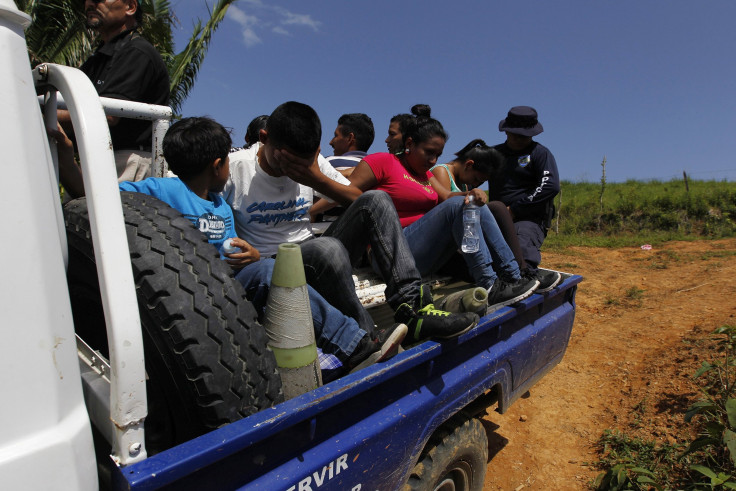Obama Proposal To Fast-Track Deportations Could Turn Away Kids Who Qualify For Asylum

President Obama may request to change a Bush-era law to fast-track deportations of child migrants, whose numbers have been surging in recent months, a move that immigration reform advocates say could turn away many children who qualify for asylum in the United States.
A White House official confirmed to USA Today on Wednesday that the administration is considering making changes to the Trafficking Victims Protection Reauthorization Act (TVPRA), which requires that unaccompanied child migrants, excluding those from Canada or Mexico, who are apprehended by Border Patrol agents be held in custody by the Department of Health and Human Services before they can be transferred to the care of a family member or sponsor while awaiting trial in an immigration court. Thus far, children coming from Central American countries have been covered by these requirements, but the proposed changes would give them the same treatment as children arriving from Mexico and Canada.
The act, which was passed with bipartisan support in 2008 in an effort to protect child victims of human trafficking, specifies that unaccompanied child migrants from Canada and Mexico are subject to different procedures: Border Patrol agents must screen them within 48 hours to determine whether they would be at risk of harm if they were returned to their home country. If the agents decide there is no evidence the minor may be at risk, the child will be sent back. Extending this treatment to juvenile migrants from Central American countries would ramp up repatriations of those arriving in the recent surge of minors crossing the border.
Shawn Moran, vice president and spokesman for the National Border Patrol Council, the Border Patrol’s union of about 17,000 agents and other employees, said he would welcome the change in the law.
“That’s something we’ve been encouraging for a while now,” he said. “We feel that [TVPRA] is helping to fuel this crisis. It’s the biggest part of the trend. In the beginning we thought it was the violence, but now it’s the word of mouth and the fact that we’ve released so many juveniles. Their belief is that they’re going to come to the United States and we’re going to release them because either there’s some form of amnesty or permits that are being issued for them to stay.” He added that field interviews with detainees showed that some two-thirds of unaccompanied child migrants were arriving based on these ideas.
But immigration reform advocates say a host of other factors are contributing to the rise in unaccompanied child migrants, and that changing the law could effectively turn away many children who may qualify for asylum in the United States.
“For some of those children, I’m sure that’s true that they’ve been manipulated by traffickers or smugglers or provided misinformation about our system,” said Bill Holston, executive director for the Dallas-based Human Rights Initiative, which provides free legal counsel to child migrants. “But I also think there are children, just as there have been for the last 10 years, that are fleeing violence in their country of origin. The fear is that [changing TVPRA] is going to precipitously eliminate the kids with legitimate legal claims to get advice about those claims and pursue them if they’re valid.”
A 2012 report by the Vera Institute of Justice (pdf) said that around 40 percent of child migrants in the custody of the Department of Health and Human Services are eligible for some form of legal claim to stay, including asylum or special visas for being victims of crime or trafficking; the UN High Commissioner for Refugees estimates the figure is 58 percent.
Holston added that changing the law would put child migrants’ fates in the hands of Border Patrol agents, who are not adequately trained to deal with children.
“It takes a lot of skill and training in order to properly evaluate whether anyone has a legitimate claim to relief. It’s even more difficult to deal with children, and even more difficult to deal with traumatized children,” Holston said. “I’m glad the Border Patrol is there, but I do not think they’re the right people to deal with them.”
“I don’t think there necessarily needs to be a huge block of specialized training,” Moran said. He believes the process would be the same as it is for child migrants from Mexico. But Holston said many children from Mexico with legal claims to stay were also likely falling through the system’s cracks.
Sarah Mehta of the American Civil Liberties Union told Mother Jones’ Ian Gordon on Tuesday that Border Patrol screenings were unreliable, saying, “When they’re happening, the screenings are inconsistent, but often they’re not happening.”
The potential change to TVPRA is part of a broader effort by the Obama administration to tamp down the surge of unaccompanied children migrating across the border, whose numbers have roughly doubled every year since 2011. In the first half of 2014, more than 52,000 children were detained, and an estimated 90,000 will have attempted to cross the border between October 2013 and September 2014.
Obama, who called the dramatic increase in unaccompanied child migrants an “urgent humanitarian issue,” sent a letter to Congress on Monday saying he would seek to authorize $2 billion in emergency funds to increase border enforcement, with a detailed request to be filed when Congress returns from recess on July 7. U.S. Customs and Border Protection announced Wednesday that it was launching a $1 million international media campaign in El Salvador, Honduras and Guatemala to deter parents from sending their children across the border alone.
© Copyright IBTimes 2024. All rights reserved.






















